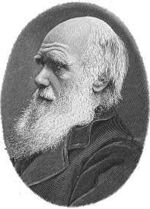Charles Darwin
Charles Darwin was a famous naturalist born in England to a Christian family on February 12, 1809. He is best known for the theory of evolution, which suggest that biological species develop over time via natural selection, branching from common origins. Outside of evolution in particular, he was regarded as an expert on barnacles as well as credited with discovering how coral atolls were formed.
Early Career
Darwin graduated tenth in his class at Christ's College in Cambridge (April, 1831). Although he intended on becoming a country parson and accepted the Bible as literally true, his intense interest in nature and discovering her secrets displaced his desire for a life as a clergyman. Darwin became the protege of the Reverend John Stevens Henslow, a professor of botany, and the Reverend Adam Sedgwick, a geologist. Henslow and Sedgwick encouraged Darwin to pursue his interests as a naturalist.
After touring the Galapagos Islands and studying the animals that lived there, Darwin developed an interest in the patterns of species distribution he had documented on the journey, as well as his realization that the economic theories of Thomas Malthus might have some application in the biological world. Researching this issue on a global scale, he slowly developed his theory of natural selection and finally published The Origin of Species in 1859. Darwin had not originally meant to publish his work so early in his life, and in fact was quite fearful of what the reception might be, but was prompted to do so after being contacted by another naturalist, Alfred Russel Wallace, who had developed similar ideas.
Religious Beliefs
Charles Darwin was a Christian up and through his famous five year voyage on the HMS Beagle. But in the ensuing two years after returning to England (1836 to 1839; and in his late twenties) Darwin abandoned Christianity (1) and [sic] "had become a 'materialist' (more or less equivalent to an atheist" (2). About twenty years later in 1859 (at the age of fifty) Darwin published his famous book The Origin of Species. "In order not to hurt the feelings of his friends and wife, Darwin often used deistic language in his publications" (3). According to Darwin, the "manifestly false history of the world" (4) as recorded in the Old Testament and New Testament miracles led him to reject Biblical veracity (5). Eminent Darwin biographer, Professor Janet Browne, sums up Darwin's views concerning religion: Darwin "mapped out a comparitive evolution of the religious sense, proposing that religious belief was ultimately nothing more than a primitive urge to bestow a cause on otherwise inexplicable natural events...In short, he made no secret of his view that he did not believe religion to have any rational foundation at all" (6). Yet, in spite of these views, when he died in 1882 at the age of seventy-three, Darwin was buried at Westminster Abbey next to Sir Isaac Newton.
When investigating transmutation of species he knew that his naturalist friends thought this a bestial heresy undermining miraculous justifications for the social order, the kind of radical argument then being used by Dissenters and atheists to attack the Church of England's privileged position as the established church. Though Darwin wrote of religion as a tribal survival strategy, he still believed that God was the ultimate lawgiver. His belief dwindled, and with the death of his daughter Annie in 1851, Darwin finally lost all faith in Christianity. He continued to help the local church with parish work, but on Sundays would go for a walk while his family attended church. He now thought it better to look at pain and suffering as the result of general laws rather than direct intervention by God. When asked about his religious views, he wrote that he had never been an atheist in the sense of denying the existence of a God, and that generally "an Agnostic would be the more correct description of my state of mind.". Ultimately he found that his discoveries conflicted with the belief in God as the one and only truth.
References
1. Mayr, Ernst Growth of Biological Thought (1982:402).
2. Mayr, Ernst One Long Argument (1991:75).
3. Ibid. (1991:75).
4. Barlow, Nora (editor) The Autobiography of Charles Darin (1958:85).
5. Ibid. (1958:85-87).
6. Browne, Janet Charles Darwin The Power of Place (2002:341)
